|
Kirk John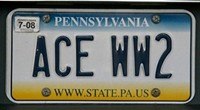
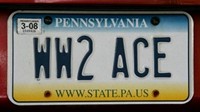
If you see either of these two license plates you will know the vehicle belongs to Leedom Kirk John, or L. Kirk John as he is better known. Mr. John flew the P-51D Mustang in WWII and became a combat ace while flying with the 338th Fighter Squadron, 55th Fighter Group, 8th Air Force. Kirk is married to a great gal, Linda. I thoroughly enjoyed talking to these two wonderful people. They are both as real as it gets. I would be remiss not to thank my good buddy, Horace Sagnor, for helping to set up this interview. Enjoy.
Kirk John: I was born on Harmony Street between Fifth and Sixth Avenue and I’ve lived in the Coatesville area all my life. We built this house in 1950 so we’ve been here for 57 years. We raised our family here. MAH: What was life like growing up in Coatesville? Kirk John: Well, I had quite a career with the YMCA. I joined when I was eight years old to go to Camp Chesapeake. I fell in love with Chesapeake and the Y. I’ve belonged to the Y now for eighty years. That’s eighty consecutive years. They gave me four memberships when I was in the service for four years. So, I spent a lot of time at the Y. I was always interested in sports. I was a three-letter man in high school. We used to take the kids down there (Coatesville) and walk around. My son would say, ‘Dad, you know everybody’. Now I walk around Coatesville and don’t know anybody. MAH: You were also a welder before the war? Kirk John: I was a welder. I was welding the day the Japanese attacked Pearl Harbor. It was a day shift I was on and they called us all to the center there where they post the jobs and told us what happened. And we listened on the radio and heard what was going on out there. Of course, that was December ’41 and I went in the service in September ’42. I had a deferment because I was a Navy-certified First Class welder working on submarine engines so I could have stayed there (at Lukens Steel), but I wanted to go into the Air Force. I always wanted to be a pilot. I always wanted to go to West Point. I didn’t get to go to the Point, but I got to fly the best - the Mustang. MAH: So you’ve always been interested in aviation even as a young kid in Coatesville? Kirk John: Back when I was little there weren’t very many airplanes. We lived at the top of Eleventh Avenue and when an airplane went over I’d liked to knock the door down to see it. I remember the day when Lindberg flew over our house and he landed on what is now Lone Eagle Road. MAH: I never heard this story. Kirk John: Well, he was looking for the Coatesville Airport and he saw a beacon on top of the hill where West Bradford School is today. He thought that was the airport. Since he was running out of fuel he landed on the road next to the beacon. That road was renamed Lone Eagle Road in honor of Lindberg’s landing there. My dad and I went out to see the plane. We never saw Lindberg but we did see his plane. Of course this was after he had already become famous from crossing the Atlantic. I think I was around eight at the time. MAH: That is a great story. Any more aviation stories from your childhood? Kirk John: I remember going up to the old Coatesville airport when it used to be on the north side of Lincoln Highway. They started a mail route and I used to go up and watch them grab the bag between the posts. One time I went up there with my Mom and Dad. I remember I was eight and I weighed 47 pounds. They didn’t want to go on a plane but they put me on a Ford Tri-motor and I went out over Lukens and back again for a penny a pound. MAH: A 47-cent airfare. Such a deal. Kirk John: It was great. That was my first flight. MAH: What kind of planes did you fly when you were training? Kirk John: A Stearman as the primary and a Vultee Vibrator as basic (the Vultee BT-13 Valiant was nicknamed the Vibrator by student pilots). Then I flew the AT-6 Texan in advanced training and the P-40 Warhawk in operational training. Never got close to a Mustang until I got to England, but when I saw my first one up close, I fell in love with it. MAH: Ever see a two-seater? Kirk John: I didn’t see one until the war was over when they sent us to Germany with the occupational Air Force. We had a couple of two-seaters to fly guys who were going stateside up to Holland or Belgium to catch a ship to cross the Atlantic. One time I flew up to Hamburg to pick up a black officer. She was a big stout lady. We couldn’t get the parachute on her back so we put it on her lap and quick closed the canopy. We got down to Kaufbeuren and it’s right near the Alps and she said, ‘Oh, can we fly through the Alps’. I said sure and we took a few passes through the Alps. When I got to the base I did a fighter peel-off to cut my airspeed down and the lady passed out. She didn’t come to until after we landed. The funny thing is she never got sick. She told me she had a grand time. MAH: How did you feel when you got your orders? Kirk John: I had no idea where I was going. I said goodbye to her (Linda) at the railway station and took a train down to Punta Gorda for operational training. Then I got orders, came right back up to New Jersey and spent a few days getting ready to pull out for Europe. I wasn’t allowed to make phone calls or let anybody know where I was going. We boarded the Queen Mary at 2AM and tug boats pulled us out with no fanfare, no nothing. Because they did not want anyone to know who was on board, we had to stay below deck, so we didn’t even get to see the Statue of Liberty. We could not go above deck until we were well out to sea. MAH: Did you get seasick at all? Kirk John: Never. Took us five days to get over there, but coming home they put us on a liberty ship. That took eighteen days. Many guys on that cruise, as bumpy as it was, lost their meals, but I didn’t. MAH: What was it like when you first arrived at Wormingford? Kirk John: When I first got there they took me to a Nissen hut where there were four empty beds and said, “Take your choice. We lost four last week.”
Kirk John: No, not really. It’s a part of war. MAH: I did a little research on your plane and discovered that another pilot flew it besides you. Do you remember a Captain Haworth? Kirk John: Yes, I do. Russell Haworth was also an ace. MAH: When he flew that plane it was called ‘Krazy Kid’ was it not? Kirk John: Yes, it was. He went home for R&R and I got his plane. MAH: How does that work, renaming a plane? Do you say I want to rename this plane such and such? Kirk John: You didn’t say anything. I flew it as ‘Krazy Kid’ until I got shot down. Then I got a new Mustang and named it Ornery. Another pilot flew that one and was shot down and killed so they gave me another plane and I named ‘Ornery II, Teacher’s Pet’. MAH: You flew 47 missions? Kirk John: Forty seven missions, 334 hours. Of the 47 missions, 45 were escorting the bombers, and only two were strictly bombing runs and that was during the Battle of the Bulge. For two consecutive days, we bombed bridges so the Germans could not use them and be re-supplied. MAH: The 55th Fighter Group also had P-38s? Kirk John: They did. All three squadrons had them from D-Day until September when they went to all Mustangs. MAH: How many times were you shot down? Kirk John: Just once. That was enough. I was a relatively new combat pilot and on my fourth mission, flying my squadron commander’s wing. We had taken the bombers into their target area, and picked them up on their way back. Along the way we shot up some railroad trains. As we were flying back to our home base in England, flying into the sun, somebody yelled, ‘Bogeys at 4:30, low’. We were at 18,000 feet. I looked back behind my starboard wing and couldn’t see the planes but I could see shadows of the planes on the ground. Our commander was Elwyn Reghetti. Reghetti said ‘prepare to battles’ and gave me a two second interval. He rolled over and went down and I rolled over and went down. Then the element leader and his wing man went down, so all four of us went down. We went in behind what turned out to be sixteen FW-190s, four flights of four. And they didn’t even know we were there until we were shooting them. We jumped on them and got them real easy. But we were going so fast, over 500mph, that we didn’t want to fly out in front of them so we did high wing-overs to cut down our power. By that time there were two way out in front of us, one to the left, one to the right. Reghetti decided to take the one to the left and my job was to protect his tail so I got in behind him. We chased this 190 down to tree top level and the turns were tight, real tight. Reghetti fired a few bursts at him. The German knew he was going to get it so he went into a tight turn and stalled. He went into the ground and burst into flames. We doubled back to get photos. So Reghetti got two and all together we got five that day. That was my first combat and everything happened inside three minutes. 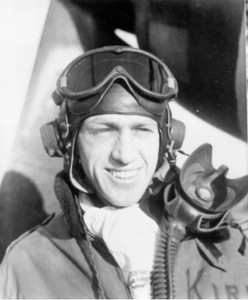
MAH: All during that time are you talking to each other on the radio? Or is that strictly stuff you see in the movies? Kirk John: No. The last thing our commander said was, ‘Prepare to battles’. That’s it. MAH: Any other missions that come to mind? Kirk John: The next mission that stands out was my tenth one on January 7, 1945 - the day I got shot down. We escorted the bombers to their target like we always did and we found targets of opportunity. One of those targets for us was an airfield in the Ruhr Valley. When we went in over the airfield there was a Focke-Wulf 190 ready to take off about a thousand feet out in front of me. I fired and I hit him real good right where the wing went into the fuselage. I kept the same course and as I approached the downed 190, he blew up. The explosion lifted me up on my port wing and I was afraid I was going to cartwheel. That’s when I called on the Lord for help and we got the aircraft straightened out. Now I’m heading straight for a German hangar. I fired at two stripped-down 190s in the hangar and almost didn’t pull up in time, just missing the top of the hangar. Then I got out over some woods and that’s when my trouble really started. I knew it was the Holy Spirit that told me to look down so I looked down and saw a German gun emplacement up in the treetops with three Germans kneeling by it. It was too late to get a shot at them. As I flew by I saw them scramble to the gun and I knew they were out to fire on me. So I turned my tail to them and I fishtailed down through the woods but they got me anyway. Oil came back on my windscreen. I couldn’t see a thing. I’m down at treetop level and I needed 5,000 feet to bail out so I prayed that I could get up to altitude. Turning west, I managed to get up to 5,000 feet, yet I was afraid to bail out, so I figured I’d stay with it until the engine quit and then I’ll bail out. For 12 minutes I flew at 5,000 feet. When the engine started to sputter I was still afraid to bail out, so I found a field to land with at least eight inches of snow on it. That was enough of a cushion for a belly landing so I kept my wheels up. For fear of catching on fire, I immediately jumped out of the cockpit. On the edge of the field stood three people, so I started walking towards them and they all disappeared. I walked back to my Mustang, took off my parachute, my Mae West (type B-4 life jacket), and the rest of my gear and tossed it all into the cockpit. When I turned around, where there once were three people, now there was one figure. As I cautiously approached the silhouette, I soon realized it was a young girl about fourteen years old. She understood me when I uttered, “Americana”.
“Where are Germans”, I continued. When she said, “Twenty kilometers”, I realized I was twenty miles from the Battle of the Bulge line. MAH: So you flew 5,000 feet over the Battle of the Bulge. Kirk John: Yep. MAH: The Good Lord was with you. Kirk John: Amen. MAH: What happened after you talked to the girl? Kirk John: Soon, a man came along driving a horse and wagon full of what looked like beer barrels. He took me about two miles and dropped me off on an autobahn. About an hour later a GI truck came by, picked me up and took me to a Ninth Air Force base. By then the Ninth had advanced into Germany, but we were in Belgium near Brussels. MAH: That is incredible. Kirk John: On another mission I found myself alone over Germany. I was shot up pretty bad. My radio was out. I came to a coastline but I didn’t know what coast it was. Was it the British Isles out in front of me? Am I above it, below it…..what? My fuel gauge told me I had about an hour or and an hour and a half of fuel left so I figured I’d fly for a half hour over this body of water, and if I don’t see land I’d turn around and come back. As the half hour elapsed no land was in sight so I turned around. When I approached the coast I decided it would be safer to head south. After passing two airfields that were severely cratered I found one I could land on, still not knowing where I was. I found out I was in Bordeaux, France. That night I slept in a bombed-out chateaux that had a wall missing on the west end. There was a big fireplace on the east end of it. I spent all night in front of that fireplace drinking tea from a metal cup. Other people were in there but I didn’t know any of them. Next day, I told a young lady that I needed 150 gallons of high octane gasoline and she said okay. She left but came back with others….and gasoline, but it was regular. I didn’t know if a Mustang would run on regular grade, but I figured what the heck. Turns out it ran fine. I took off, flew up the coast, found Calais, crossed the Channel and back to my home base at Wormingford in England. MAH: I guess you were always crossing the Channel. Kirk John: A lot of our missions took us out to the North Sea and around to Norway and Sweden. One time we went in and hit Hamburg. There were submarines docked and we fired API (Armor Piercing Incendiary) bullets at them right at the waterline. We figured that way they would sink. We made three of four passes. That was a lot of fun with no one shooting back at ‘ya. MAH: What was housing like at your Wormingford base. Kirk John: We were in Nissen huts, ten to a hut. MAH: All pilots? Kirk John: Yeah. In the morning we would hear the B-17s above us with their engines droning. They would take off at 5AM. We would get up about 6:30, have breakfast, get briefed and be on our way. The B-17s would cruise at about 190(mph) and we would cruise at about 325 so it didn’t take us long to catch up with them. MAH: How was chow? Kirk John: No complaints, either at Wormingford or in Germany. At Kaufbeuren, German women would come in and make our beds and cook for us. They treated us great. It was beautiful country, about five miles from the Alps. I had no problems with the Germans. I would rather have been fighting the Japanese. They were the ones who attacked us and they were the ones I was mad at. But, you go where they send you. MAH: What was it like in occupational Germany? 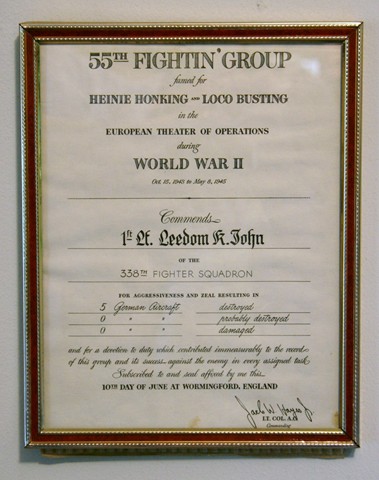
Kirk John: I was a flight leader then Operations Officer. One day I scheduled two guys to go up to fly instruments. One was supposed to go under the hood and the other one was a safety pilot. Then they were supposed to change roles. Well, they got to fooling around up there and had a mid-air collision. One pilot was killed. Because of the crash I was confined to quarters until the Commanding Officer of the wing came down and I was exonerated. At the time I was up for my captaincy. I never got it and I think that incident kept me from getting it. When it was time for me to go home, the higher-ups said, “Oh, stay and you’ll get your captain’s bars and soon you’ll fly jets. But I wanted no part of it. I wanted to go home and get married. Linda: Yes, I’m the reason he didn’t get his captaincy. MAH: I’d say he made the right choice. Kirk John: We’ve got 61 years. MAH: God bless you two. Kirk John: We were at a 55th FG reunion up at State College (PA) and there seven of us gathered around the table and one pilot said, “You know pilots have good eyes. Take a look at the women around the table.” MAH: You’re an ace obviously. There were many aces who did not come back. In my mind they are all heroes. Kirk John: Take my squadron commander, Elwyn Reghetti. He got shot down the day before the war ended. Reghetti got on the radio and said, “I think I broke my nose, but I’m all right. You guys keep on going.” Those were his last words. Civilians got a hold of him and hung him. MAH: How much leeway were you given in picking out targets of opportunity? Kirk John: We were pretty much on our own. If we were flight leader we could take off and go with our wing man and if we were a wing man we had to stay with our element leader. Other than that we had free reign. Over a 2-1/2 month period we had taken out 940 German locomotives. Toward the end of the war the Germans began putting anti-aircraft guns on boxcars. As we would make a pass on the locomotive, the walls of the third boxcar would drop down and the gun started firing at us. According to the Eighth Air Force, we lost four times as many pilots during strafing runs as we did in aerial combat. On one such run at a train I lost a wing man and an element leader. I always liked going for the engineer’s compartment first and then the boiler. When you hit the boiler you know you hit it because all the steam would shoot out. On one particular run I saw the engineer jump out and roll down a hillside before I even opened fire. He was like, ‘Take my engine; I’m getting out of here’. MAH: Ever run out of ammunition. Kirk John: Never. And I never had a misfire. When I squeezed that trigger all six guns fired. MAH: Do you keep in touch with those you flew with? Kirk John: I did but they are pretty much all gone now. MAH: Is it true that you chased a Me-262? Kirk John: Yes, I did. It was toward the end of the war. This 262 came in front of me attacking a bomber. He got the bomber and went past my wind screen. I fired a few shots then tried to go after him. I had my Mustang up to 620mph and the thing started shaking so I had to back off. That was my one encounter with a 262. The only time you could down one was when they were taking off or landing. MAH: After the war you flew in the reserves? Kirk John: I did. I flew in the reserves for 2-1/2 years. I got out in January ’46 and we got married in June ’46. I flew until June ’48 when my son was born and then I quit flying. MAH: Did you fly the Mustang in the reserves? Kirk John: No, I flew AT-6s. MAH: You had no interest in commercial aviation after the reserves? Kirk John: I went and got my commercial license but I never tried to get into flying commercial. One guy did offer me a job. He wanted me to go to Florida and haul produce for him but I didn’t want to do it so I didn’t. MAH: After the war you went into insurance. Kirk John: Well, I went back to doing welding at Lukens for a year and a half. Actually, when I first got out, I went to Kutztown University for a semester on the GI Bill. I did really well, but I was going to get married so I pursued it no further. Then I had this chance to go with Prudential so I became an agent. 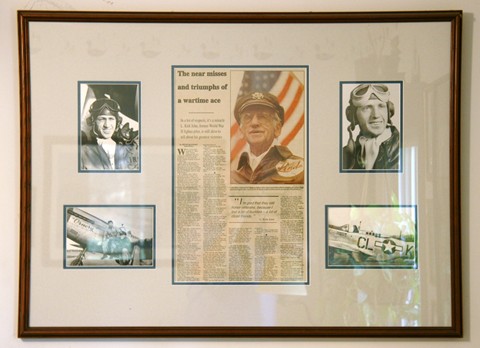
MAH: Did you enjoy that? Kirk John: I was with them 31 years. The first 15 I enjoyed it, but after that it kept getting worse and worse. They kept pushing you for more business and more business. And I did well with them. I attended many of their big conferences in places like Miami, Florida. MAH: There are a few points I want to touch on and you don’t have to answer them. The first has to do with the period leading up to WWII. Most people in the US did not want another war like WWI. We were mostly an isolationist country. Were you aware of what was happening in Europe prior to December 1941? Kirk John: I was interested in WWI because I had two uncles who were in the Legion drum and bugle corps here in Coatesville. And they would have parades and I would follow along with the buglers. In fact I played bugle when I went to Camp Chesapeake. I wanted a bugle for Christmas and I got one and learned to play it. I couldn’t read music but I could play the bugle. And there was at least six, seven, eight times I was called out of school to play taps at the graveyard service of WWI veterans. So I was interested in WWI and the aviation part of it. I knew about Rickenbacker.
Kirk John: After I got out of the reserves I was glad I was out of there. I did not want to go over there (Korea). MAH: How did you feel about the Korean War. Kirk John: You may not agree with me but I didn’t think we should have gotten into any of those wars over there…..Korea, Vietnam, the one we’re in now. I don’t believe in isolationism but I don’t believe we should go to war with these countries to stop them from killing each other. If they want to kill each other, let them go ahead and do it. I support our President. I think he’s a Christian man at heart, but he has made some bad decisions.
|
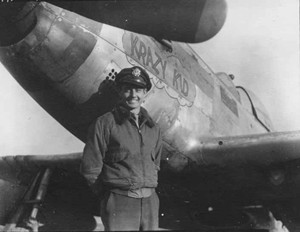 MAH: Did that bother you at all?
MAH: Did that bother you at all?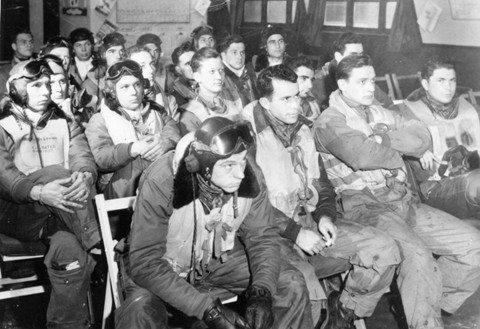
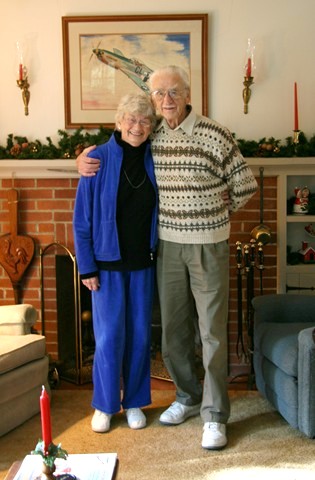 MAH: After WWII came the Korean War. You obviously owed your country nothing. Did you have any interest in going over there?
MAH: After WWII came the Korean War. You obviously owed your country nothing. Did you have any interest in going over there?